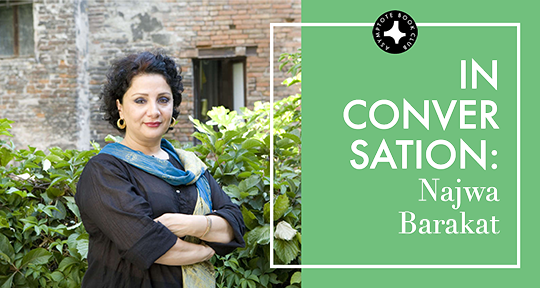In turns spellbinding and labyrinthine, psychological and philosophical, tragic and bright, Najwa Barakat’s Mister N marks the triumphant return of the Lebanese author to writing. Through the story of an aging author who wanders the streets in shifting boundaries and realms, Barakat paints a painful, fearless portrait of contemporary Beirut. We were honored to present this powerful novel as our Book Club selection for May, and in the following interview, Reem Joudi speaks with Barakat about her fifteen-year hiatus, the ghosts and pariahs of Lebanon, and the “beautiful dream” of Beirut.
The Asymptote Book Club aspires to bring the best in translated fiction every month to readers around the world. You can sign up to receive next month’s selection on our website for as little as USD15 per book; once you’re a member, join our Facebook group for exclusive book club discussions and receive invitations to our members-only Zoom interviews with the author or the translator of each title.
Reem Joudi (RJ): You wrote Mister N following a fifteen-year break from writing. Could you describe your journey back, and why you chose to return with the story of Mister N?
Najwa Barakat (NB): I cannot say that I was completely cut off from writing during these fifteen years, but my literary activity was suspended for a short while of my own volition—and not because I was struggling with writer’s block. I had reached a certain juncture in my narrative journey and in my writings, which had materialized in the publication of three novels (The Bus, Oh Salaam!, and The Secret Language). These works addressed themes of violence, cruelty, and the ordinary human being’s capacity to commit evil in specific moments or contexts. I wanted to take a “break” to think about my next steps, what the title of my forthcoming literary chapter should be, as well as to focus on my permanent writing workshop, which is dedicated to helping young Arab writers develop their storytelling projects. Thanks to the workshop, twenty-three novels have been published thus far by renowned Arab publishing houses, and some of these works have received distinguished literary awards.
To tell you the truth, I felt an aversion to what was being published, consumed, and promoted as literary works of a high caliber—works which, in reality, are lacking the minimum standards for quality writing. Add to that the horrific changes that my home country, Lebanon, was experiencing, as well as the many wars, tragedies, and revolutions that countries of the Arab region were facing, all of it produced and propagated a dreadful cosmic chaos. Together, these factors presented silence as the best option during turbulent times: choosing silence, observing [what is around me], and attempting to find the meaning and purpose of literature amid all this destruction. Mister N encapsulates this experience in all its dimensions. It describes the labor of writing and the difficulty of belonging to a reality that resembles quicksand, capable of swallowing you whole at any moment. The novel also mends my relationship with Beirut, a city I returned to in 2010 following a long absence in Paris. Since then, I’ve witnessed the transformations and defeats that foreshadowed the city’s current state of collapse and decay.
RJ: There are many ghosts that haunt Mister N’s memory—Luqman, the former warlord and protagonist from one of your earlier novels Oh Salaam!; his mother and father. . . What do these multiple, multifaceted ghosts signify, and which of them do you think has the strongest pull on Mister N’s mind and spirit?
NB: Mister N is a writer with a heavy past and a troubled present. He is battling the ghosts of his childhood and the ghosts of his current tragic reality, where parts of Beirut—namely the neighborhoods he stumbles upon and begins exploring by chance—have transformed into the gutters of society. Luqman’s ghost, as you mentioned, is a person who committed atrocities during the Lebanese civil war; Oh Salaam! takes places in Beirut, in the wake of the war and at the beginning of the so-called transition to peace, and Luqman is killed by his friend’s mother after she discovers the horrors that both men committed against innocent lives. The same Luqman will reappear twenty years after the events of Oh Salaam!, very much alive and running an Internet cafe in one of Beirut’s working-class neighborhoods. A manhunt thereby ensues between him and Mister N, who, while he fears Luqman and seeks to escape him, is also drawn to him by a mysterious and obscure thread.
All this is to say that the people who committed the horrors of war are not dead, but living peacefully among us, a situation that Mister N—a writer who treads the thin line separating reality from fiction and truth from illusion—can neither tolerate nor comprehend. For Mister N, reality turned out to be more tragic than he could have ever imagined—harsher, darker, and more cruel. What could literature do in circumstances such as these, and where does a writer, worn down and defeated by reality, find their salvation? In fact, Mister N’s suffering captures my own struggle vis-à-vis all that was unfolding around me. I was among the first authors to tackle the theme of cruelty and violence [in my novels], long before the Arab world witnessed its various collapses. I intuited them, so to speak, then was terrified to face a reality which shook me to the core—one that heralded even harsher, darker, and more violent truths. READ MORE…

